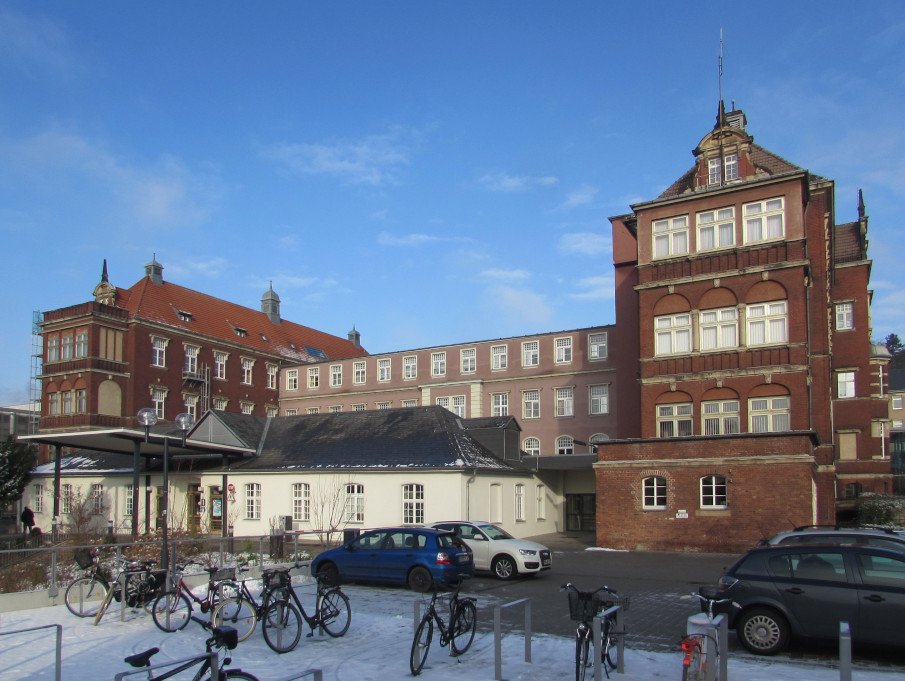If you are thinking about studying medicine in Germany, it is important you familiarize yourself with the institutions that provide you with the training to become a medical doctor. To support you with this process, this article answers the following questions for you:
How is the German higher education landscape structured to train students of medicine? And: At which universities in Germany can I study medicine?
Before we get to the 43 German medical universities and schools, here are the most important information you should know about studying medicine in Germany:
A
Medical degree
Unlike almost all other subjects, which have a two-tier system (undergraduate/Bachelor + Graduate/Master), medical studies are traditionally structured. The university course of study lasts 6 years and 3 months (standard period of study) and concludes with the so-called state examination.
B
German as language of study
If you want to do the full training in Germany and become a doctor here, you must be able to speak German. The only exceptions are some Bachelor’s and Master’s programs in the field of health sciences that are conducted in English but do not lead to approbation to work as a physician. So please read the article about the German language requirements.
C
Admission
Medical studies are among the most competitive subjects - because the demand of students who want to become medical doctors is much bigger than the number of places available. The application procedure is rather complex. As a rule of thumb, you need to have an excellent GPA in your A-Levels and/or meet one of the alternative application requirements that allow you to get admitted (e.g. admission test, interview, several years of work experience).
D
Tuition fees
At the public universities the study is basically free of charge (exception: non-EU foreigners in Baden-Württermberg and certain Masters). At the private universities the fees are about 50,000 - 100,000 € in total.
Terminology: University vs. Med school
Depending on where you are from, you may know different terms for higher education institutions and facilities that train people to become doctors. No matter if you call it medical university or med school, or if you use MBBS as synonymous to ‘training to become a doctor’, when you transfer to the German system it is usually the medical faculty of a university that will offer your medical training. The few exceptions are the universities that are specialized in medical subjects only, such as the Hannover Medical School (MHH) which is the medical university located in the capital of Lower Saxony.
If you come from a university system in which you can start your training to be a doctor by transferring to a medical school after finishing an undergraduate degree in a more or less related subject, you should also be aware that training to become a doctor in Germany starts after a student’s A-Levels, meaning after they finish high school. Medical education in Germany is not separated into an undergraduate and graduate degree. Rather, it is one comprehensive training.
In Germany, a term that is frequently used to capture the interrelated academic and practical parts of the German doctoral training as well as the structure of the German health system is university medicine (German: Hochschulmedizin). This term refers to the cooperation of the medical faculties of public universities offering medical studies in Germany, the 32 university hospitals, and the research facilities.
Complete list of public medical universities to study medicine in Germany
The majority of universities that offer medical studies in Germany are public. Some of the great upsides of that are that they have comprehensive infrastructures and research networks in Germany, that they are free of charge (no tuition fees), and offer the opportunity to engage in doctoral studies as well. All medical studies at public universities underlie certain federal regulations, influencing the course structure as well as application processes. To get admitted at one of Germany’s public universities, students typically need outstanding GPAs.
The regular courses of study all have a similar structure. The uniform structure of the regular study programs doesn’t mean that the training at different public universities looks exactly the same. It is recommendable to check out the module descriptions and specializations of each program in Germany to learn about their differences and identify a program that fits best to your interests and plans.
Furthermore, there are certain model study programs (German: Modellstudiengang) that are offered by 13 universities (in the following table marked with an [*] asterisk) including two German private universities presented below. These model programs are attempts to innovate the German study course structure and can include features such as earlier contact to patients.
List of public universities to study medicine in Germany
| City of University | Name of University | Tuition Fees | No. of Places Available (First Year)* |
|
| 1 | Aachen | RWTH Aachen University* | - | 284 |
| 2 | Augsburg | University of Augsburg* | - | 84 |
| 3 | Berlin | Charité - Universitätsmedizin Berlin* | - | 327 |
| 4 | Bochum | Ruhr-Universität Bochum* | - | 337 |
| 5 | Bonn | University of Bonn | - | 301 |
| Bonn | University of Bonn - Medical Campus Bonn/ Siegen | - | 25 | |
| 6 | Cologne | University of Cologne* | - | 189 |
| 7 | Dresden | Technische Universität Dresden* - Campus Chemnitz | - | ? |
| 8 | Dresden | Technische Universität Dresden - Campus Dresden | - | 225? |
| 9 | Duesseldorf | Heinrich Heine University Düsseldorf* | - | 411 |
| 10 | Duisburg-Essen | University of Duisburg-Essen | - | 225 |
| 11 | Erlangen-Nürnberg | FAU Erlangen-Nürnberg | - | 174 |
| 12 | Erlangen-Nürnberg | FAU Erlangen-Nürnberg/ Bayreuth | - | 55 |
| 13 | Frankfurt (Main) | Goethe University Frankfurt | - | 394 |
| 14 | Freiburg | University of Freiburg | only non-EU students: 1,500 €/semester | 337 |
| 15 | Giessen | Justus Liebig University Gießen | - | 175 |
| 16 | Goettingen | University of Göttingen | - | 185 |
| 17 | Greifswald | University of Greifswald | - | 194 |
| 18 | Halle-Wittenberg | Martin Luther University Halle-Wittenberg | - | 231 |
| 19 | Hamburg | Universität Hamburg* | - | 359 |
| 20 | Hannover | - | 270 | |
| 21 | Heidelberg | Heidelberg University - Medical Faculty Heidelberg | only non-EU students: 1,500 €/semester | 320 |
| 22 | Heidelberg | Heidelberg University* - Medical Faculty Mannheim | only non-EU students: 1,500 €/semester | 240 |
| 23 | Jena | Friedrich Schiller University Jena | - | 260 |
| 24 | Kiel | - | 206 | |
| 25 | Leipzig | Leipzig University | - | 320 |
| 26 | Luebeck | Universität zu Lübeck | - | 189 |
| 27 | Magdeburg | Otto von Guericke University Magdeburg | - | 189 |
| 28 | Mainz | Johannes Gutenberg University Mainz | - | 215 |
| 29 | Marburg | Philipps-Universität Marburg | - | 264 |
| 30 | Muenster | University of Münster | - | 142 |
| 31 | Munich | LMU - Ludwig-Maximilians-Universität München | - | 527 |
| 32 | Munich | Technical University of München | - | 351 |
| 33 | Oldenburg | University of Oldenburg* - European Medical School Oldenburg - Groningen (NL) | - | 80 |
| 34 | Regensburg | Universität Regensburg | - | 230 |
| 35 | Rostock | University of Rostock | - | 215 |
| 36 | Saarbruecken | Saarland University | - | 281 |
| 37 | Tuebingen | University of Tübingen | only non-EU students: 1,500 €/semester | 164 |
| 38 | Ulm | Ulm University | only non-EU students: 1,500 €/semester | 325 |
| 39 | Wuerzburg | Julius-Maximilians-Universität Würzburg | - | 158 |
*reformed model programs: Structure of studies differs from that offered in the more common regular programs.
Source: Hochschulstart (Winter semester 2019/20) or website of the university.
Private medical universities to study medicine in Germany
Main building of the Brandenburg Municipal Hospital.
© Gregory Rome. Type of license: CC BY-SA 4.0.
There are four private German universities that offer medical studies. Unlike the public universities, they are not subject to the nation-wide NC and, therefore, the application process differs and is not only dependent on the applicants’ GPAs. You can still expect, however, to undergo some rigorous testing system in order to get admitted to these universities. On the downside, students need to pay fees to the private universities, which currently amount to 5,700€ - 15,000 € per semester, depending on which university you choose.
Regarding the quality of training that can be obtained at the private universities, the proximity to hospitals and focus on practical experiences in early stages of the career are praised. Partially, it is criticized that these universities are not as strongly focused on research as the public ones since they lack access to the German university hospitals.
When it comes to the students’ ability to practice as physicians in Germany after their studies they, as of now, should not be experiencing problems if they study at one of the private universities in Germany. These four private schools are German institutions and offer medical training that leads to the state examination, just like the German public universities do. Therefore, students have the approbation to work as doctors in Germany after their studies:
Foreign medical schools with campus in Germany - an alternative
There are other private options that are subsidiaries of other European universities. Students of these universities study in Germany under the regulations of the cooperating university’s local regulations. This means that, despite studying in Germany, they are trained as doctors according to the university’s country’s definition.
Often, the training at these foreign medical schools includes stays abroad at the respective superordinate universities. Because of an EU regulation, graduates from these universities, which are located in (former) EU countries, are able to work as doctors in Germany after their graduation:
- Kassel School of Medicine, subsidiary of British Southampton University.
- Asklepios Campus Hamburg , subsidiary of Hungarian Semmelweiß-University in Budapest.
- Paracelsus Universität Nürnberg, subsidiary of Austrian private university in Salzburg.
- Universitätsmedizin Neumarkt am Mieresch Campus Hamburg, subsidiary of Romanian public university in Neumarkt am Mieresch.
What is the best medical school in Germany?
To find the best university in Germany to study medicine as an international student, you might be interested in finding out how different universities and medical faculties fare in rankings. Overall, rankings can be a useful tool to compare certain aspects of different universities and you can obtain an overview of various rankings in our article.
If you are looking for the best German universities to study medicine in international rankings, we advise you to check out the subject rankings that are published by the different ranking agencies. For example, the QS World Universities Ranking, the Shanghai Ranking, and the THE World University Ranking allow you to compare the top universities around the world for medical studies and medical subjects. In these three rankings, Heidelberg University fares best.
Additionally, you can take into consideration national rankings that only compare German universities. The CHE subject ranking allows you to compare German universities that offer medical studies. After registering for free on the website, you can select criteria that are most important for you. This can be a broad array of things, such as how many students use their bike in that town, the number of seats available in the library, the amount of students graduating in time, or the research output. We recommend you have a look at this ranking, because it is partially based on student surveys and can give you a good idea on what it’s like to be a student in a certain city.
In summary, rankings can be a good way to get an overview over your options, or may sway your decision to choose one university over another. Still, we recommend to not overrate rankings. Especially when it comes to studying medicine in Germany, there is a fairly homogeneous level of quality. In fact, because of a system of cooperation and specialization, each faculty is known and leading in different disciplines, so informing yourself on areas of specializations of different faculties might be an even more promising strategy to identify the best medical university in Germany for your interest. Furthermore, no matter where you study, the employment rate for medical practitioners in Germany is very high.
Top 10 Biggest Medical Faculties in Germany
Ranked according to number of enrolled students in all medical programs of that faculty (as of August 2020):
- Charité - Universitätsmedizin Berlin - 8,077.
- LMU - Ludwig-Maximilians-Universität München - 6,911.
- Heinrich Heine University Düsseldorf - 4,366.
- University of Tübingen - 4,140.
- Heidelberg University - 4,033.
- University of Cologne - 3,600.
- Hannover Medical School - 3,521.
- Universität Hamburg - 3,450.
- University of Freiburg - 3,300.
- Ulm University - 3,234.
The role of university hospitals in Germany
Learning about the way that medical training in Germany is organized can furthermore help you to make a decision on where to study. Universities cooperate with certain hospitals for the practical portions of the medical studies. The 32 university hospitals (German: Universitätsklinikum) in Germany are some of the most important places for the exchange of theory and practice for medical students in Germany.
University hospitals are the flagships within the German health system, since they possess the highest technology and the highest degrees of specialization. They combine the practical care of patients with research and therefore provide a great environment for medical students who are looking to engage in research throughout their studies and acquire a doctoral degree. With support of other teaching hospitals (German: Lehrkrankenhäuser) university hospitals provide and organize most of the practical training for medical students in Germany.
Distribution of specializations and expertise throughout Germany
With these features, university hospitals are the best equipped and highest performing health care facilities in Germany. To operate at such a high level, specializations and expertise are distributed to different university clinics throughout Germany. Therefore, each university hospital with the associated research institutions and medical faculties is a hub for improving and researching certain illnesses or treatments. For an easy to grasp and interactive overview over, inter alia, research focuses of different locations, make sure to check out the Landkarte Hochschulmedizin.
Informing yourself on the research foci of different universities can be supportive of your decision on where to apply to study medicine, since being in a location that sets a focus on a topic close to your interests and beneficial for your planned career is a smart move. This can also be a very useful strategy for students who are not looking to finish their training to become a physician in Germany, but would rather engage in research activities and pursue doctoral studies or a master’s degree in health sciences.
Especially doctoral candidates might want to check out the so-called competence networks medicine which are locations for excellent and globally recognized research. For example, German nobel prize of medicine winner Harald zu Hausen is organized in one of them.
















